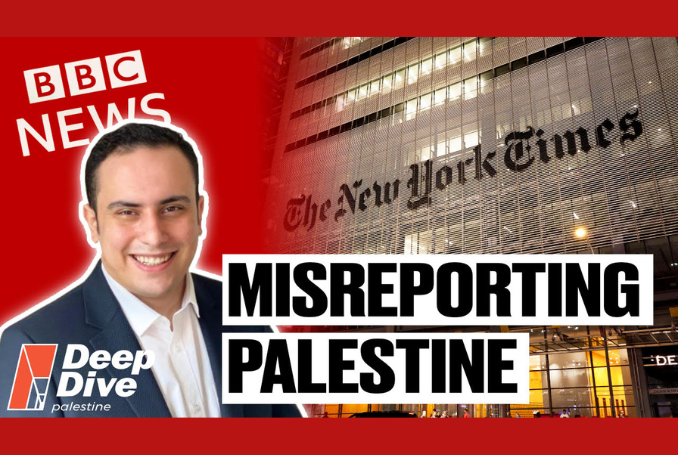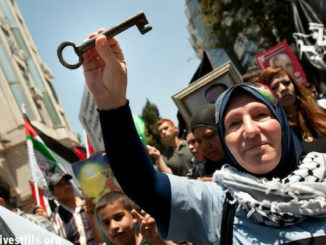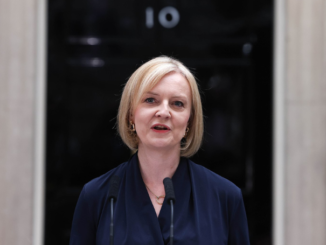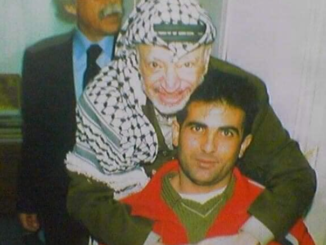
In its latest live show, Palestine Deep Dive explores the widespread bias in the Western media’s coverage of Palestine, examining recent and past reporting in major outlets including the BBC and The New York Times.
The show titled, “Misreporting Palestine: Western Media, Double Standards & the Sins of Omission” sees show host, Mark Seddon, who was the first UN correspondent for Al Jazeera English, in conversation with Ahmed Alnaouq.
Alnaouq is a Palestinian journalist from Gaza currently serving as an advocacy officer at the human rights group, EuroMed monitor. His personal story of how his brother and friends were killed in 2014 in a targeted Israeli missile strike inspired the creation of We Are Not Numbers, an organization devoted to amplifying young Palestinian voices and training their next generation of writers.
Becoming a Journalist in Gaza
“The war on Gaza in 2014 started and I lost my brother and many of my friends. Then I started to read the media in the West and I was devastated. I was irritated with how they report the news on Palestine… we’re sick and tired of seeing the Palestinians dehumanized, demonized and mentioned only as numbers…My brother and six of my friends were killed, and in the news it said, ‘Six Palestinians were killed,’ and I was devastated and I lost hope in the Western media.”
Going deeper, Seddon mentions the forced fragmentation of the Palestinian people and how this often gets misreported in the Western media, serving to strengthen the grip of Israel’s apartheid rather than expose it:
“You can be an Israeli Arab in Israel… you can be a Gazan. In a way, it almost starts off not only by de-legitimizing you as a people and as individuals, you become numbers, but you can’t even be Palestinians.”
In response, Alnaouq says:
“We can’t be Palestinian. I’ve always said that if I were just born a few meters on the other side of the fence… If I were born as a Jew, I would have complete rights, but just because we’re Palestinian, just because we were born on this specific spot in the Gaza Strip, we have been deprived of all of our basic and fundamental human rights.”
Discussing the power of personal stories, Alnaouq emphasizes his feeling that if these were reported on from Palestine how it could massively enhance the public’s understanding on the real situation:
“I’ve lived my life in Gaza, I’ve experienced three wars. I’ve grown up to experience the siege that has been ongoing for the past 15 years. I lost my brother in the war, I lost my mother due to Israel banning her from traveling to receive [medical] treatments. I’ve never seen these stories in Western media. This is what we’re talking about. It’s the sins of omission because if they included these personal stories, if they included these basic human rights that we’re deprived of, it will make a huge shift on how Westerners view the Palestine-Israel conflict. It is deliberately and systematically omitted from the media.”
Referencing the 15 year anniversary of Israel’s hermetic siege on Gaza this week, where now 55% of children have contemplated suicide according to Save the Children, Seddon remarks:
“With the closure of Gaza… making what many people have described as the biggest open-air prison in the world, you might have thought that was a story that the Western media might have picked up on!”
“I’ve always said that Gaza is the most fertile place for journalists,” Alnaouq responds.
“We have a story in every single house, if you walk in the street and if you look at anyone you might encounter, everyone has a story and a personal story that deserves to be told, but I haven’t seen that in the media.
“For example, a few weeks ago, at Euro-Med, we organized this exhibition for an artist in Gaza to show her artwork. Her name is Zainab Al-Qolaq, she lost 22 family members during the last war in Gaza, and she was also injured. She painted these beautiful paintings and we expected that all of the Western media will come to interview her, to talk about her, but no one talked about her.”
Coverage of The Great March of Return
Taking a closer look at specific coverage, the two turn their attention to a BBC article produced during Gaza’s Great March of Return.
The piece written on May 14, 2018 is titled, “Gaza Clashes: 52 Palestinians killed on deadliest day since 2014”
Seddon begins: “ ‘Gaza clashes’. A clash, but this is– ’52 Palestinians killed on the deadliest day’. A clash. I speak English as my first language. I’m from England where this mother tongue. A ‘clash’ is usually a dispute involving two people, two equals. A ‘clash’. What do you make of that headline there?”
“I’ve been in the March of Return. I attended most of the Fridays of the March and I have never seen ‘clashes’.” Alnaouq responds.
According to the UN, over the course of 86 weeks beginning in March 30 2018, at least 34,000 Palestinians were wounded and over 300 killed by Israeli forces, many of whom by live ammunition from Israeli snipers, as they protested their incarceration along the perimeter boundary of Israel’s siege. The UN reports six Israeli fatalities.
“Over 40% of the Palestinians in Gaza are children who have been born [there] under siege, under occupation, under massacres. Then they decided to demonstrate peacefully, to demand the right of return, a right that has been guaranteed by the United Nations Resolution 192.
“More than 52 Palestinians were [killed] in one day and more than 1,000 were injured at the same time. Then the BBC calls it clashes. There were no clashes. I have been there. I’ve never seen clashes. I’ve seen thousands and thousands, tens of thousands of Palestinians participating peacefully in the March of Return.”
Digging deeper into the article, Alnaouq picks out a sentence that begins: “There have been six weeks of protest at the Gaza border…”
“There is a huge problem with this word, with this terminology, this glossary of the BBC. We do not have borders in Gaza. Israel did not declare its borders yet… What’s separating us from Israel is a fence that is built in order to impose and entrench the apartheid regime that Israel is forcing against us.”
Criticizing the BBC’s repeated assertion that the March was led by Hamas, Alnaouq says,
“The March of Return was organized by a Palestinian poet named Ahmed Abu Artema with many, many other peace activists… A respected journalist would go and interview the organizers of the March of Return, and we all know the organizers of the March of Return, but they did not do that. They went to the Israelis and they quoted them. Of course, Israel will say it’s led by Hamas because they want to justify the killing of innocent Palestinians, and then the BBC would just quote them. This is a lie and we all know it’s a lie.”
Moving on to examine an article from the New York Times titled, “Israeli military kills 15 Palestinians in Confrontations at Gaza Border”, Alnaouq continues:
“We did not have ‘confrontations’. We had Palestinians protesting peacefully. I have never seen anyone at the March of Return who is holding a gun or shooting at the Israelis, and Gaza does not have borders. Then if you go to the byline, the [author] of this article is Isabel [Kershner], who has a son who serves in the Israeli army.”
Emphasizing the brutality of the Israeli occupation force’s response to the protests, Alnaouq recounts his own experiences:
“One moment I can’t forget is [when] an Israeli soldier shot someone, and he was only two meters away from me. He was an 11-year-old child. I’ve seen him so far away from the fence. He never hurled a stone. He did not shout. He was just there when he was shot and he was killed instantly. The one who killed him on the other side, we’ve seen these soldiers waving and celebrating and [giving] high fives to each other.”
At least 50 children were killed by Israeli forces during the protests. They also shot dead Palestinian paramedic Razan Al-Najjar, 21, as she treated another protestor who had been injured and Ibraheem Abu Thuraya, 29, a wheelchair-bound double amputee who lost both legs in an Israeli air strike.
Challenging Pro-Israel Media Monitoring and Lobbying
Investigating the reasons why Western media so often seems incapable of telling the truth when it comes to Palestine, Alnaouq plays a clip from a Novara Media video titled: “Why The Media Can’t Tell The Truth On Israel & Palestine” produced in June 2021. Presented by Aaron Bastani, the video begins:
“It’s simple, it’s about intimidation, and don’t you dare make the slightest positive noise supporting Palestine, or else there’ll be consequences. Now, this electric fence approach is built into the media institutionally through a network of pro-Israel pressure groups who specialize in media monitoring and orchestrating complaints.”
He then proceeds to list examples of such groups which include HonestReporting, CAMERA (the Committee for Accuracy in Middle East Reporting in America), Palestinian Media Watch, MEMRI (the Middle East Media Research Institute) and BICOM whose Advocacy organization in the UK is called We Believe In Israel.
A clip played from John Pilger’s 2010 documentary The War You Don’t See featuring British academic Greg Philo, Director of the Glasgow Media Group and author of Bad News from Israel, seems to corroborate Bastani’s assertions:
“After we did the first book, I gave a number of talks to two journalists in Britain, to BBC journalists, and I spent time with people who were senior producers on television news. One of them said to me, in the context of quite a heated discussion that was going on with other journalists, he said, ‘Listen, we wait in fear,’ that was his exact words, ‘We wait in fear for the telephone call from the Israelis. The only issue we face then is how high up it’s come from them, has it come from a monitoring group? Has it come from the Israeli embassy? Then how high has it gone up to our organization? Is it the duty editor? Has it gone above that? Is it the director-general?”
Turning to an article by the BBC published in 2018, Alnaouq displays a graphic showing the original headline which reads “Israeli airstrikes ‘kill pregnant woman and baby’”. But following a Tweet from Israel’s then Foreign Ministry spokesperson, Emmanuel Nashon ordering the BBC to “change it IMMEDIATELY!!!”, the headline indeed changed to “Gaza airstrike ‘kill woman and child’ after rockets hit Israel”.
Looking towards the recent killing of Shireen Abu Akleh by Israeli forces, Alnaouq analyses The New York Times’ headline: “Shireen Abu Akleh, Trailblazing Palestinian journalist, dies at 51.”
“This is not journalism” he protests. “We learn in journalism that you have to start with an active voice, you have to say who killed these people… if you say that a Palestinian journalist was killed by Israel, while she was covering the news while wearing a blue vest, people will want to read more.”
Seddon agrees, “She was targeted, she was killed, and there is no doubt about that, really, because people who were there, who saw it, have given witness to it, and The Washington Post just a couple of days ago confirmed that had happened as well, apart from all of the other things.”
Closing the show, Seddon asks Alnaouq how the “Palestinian rebuttal machine” can be strengthened to challenge the effectiveness of pro-Israel organizations lobbying the media to fit their desired narrative. He responds:
“We as Palestinians, of course, need to do more and more work. That’s why we started We Are Not Numbers… I think, yes, it is the Western media’s responsibility, to tell the truth, because they are obliged by professionalism to tell the truth as it is.”
“Those journalists who always give Israel an excuse and justification for their killing and for the suffering that they’re inflicting on the Palestinians, they are complicit in these crimes. This has to change because media matters and journalism matters. They have to respect their profession and they have not to be a coward. They have to be brave enough to tell the truth as it is.”
(Palestine Deep Dive)







